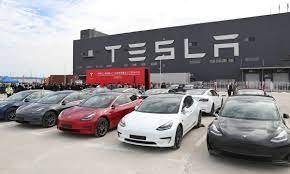In a strategic move to expand its global presence, electric vehicle (EV) manufacturer Tesla has announced that its executives will be visiting India. This visit signifies Tesla’s interest in exploring opportunities beyond its prominent market in China. The company aims to tap into the growing Indian market, which holds immense potential for the adoption of sustainable transportation solutions.
Tesla’s decision to explore the Indian market comes as no surprise, given the country’s increasing focus on renewable energy and the government’s push towards electric mobility. India has set ambitious targets for electric vehicle adoption and aims to have a significant portion of its vehicle fleet running on electricity by 2030. With its innovative and technologically advanced electric cars, Tesla aims to play a pivotal role in India’s transition to sustainable transportation.
The visit of Tesla executives to India marks a significant milestone in the company’s plans for global expansion. Tesla’s CEO, Elon Musk, has previously expressed his interest in entering the Indian market but faced several challenges, including import duties, high taxes, and limited charging infrastructure. However, recent policy developments and initiatives by the Indian government have created a more favorable environment for EV manufacturers, including Tesla.
During their visit, Tesla executives are expected to hold discussions with various stakeholders, including government officials, industry experts, and potential business partners. These engagements will provide Tesla with insights into the local market dynamics, regulatory framework, and infrastructure requirements. Such interactions will help Tesla assess the feasibility and formulate a comprehensive strategy for its operations in India.
The entry of Tesla into the Indian market holds significant promise not only for the EV industry but also for the overall economy. Tesla’s presence is likely to stimulate technological advancements, attract investments, and create job opportunities in the electric vehicle and clean energy sectors. Additionally, it will encourage domestic automobile manufacturers to ramp up their efforts in developing electric vehicles, contributing to India’s vision of becoming a global manufacturing hub for EVs.
Moreover, Tesla’s entry could have a cascading effect on the charging infrastructure in the country. The company’s expertise and experience in building a network of Supercharger stations worldwide could help accelerate the establishment of robust charging infrastructure in India. This, in turn, will address one of the critical barriers to electric vehicle adoption and provide a more seamless experience for Tesla owners and other EV users.
In conclusion, Tesla’s decision to send its executives to India marks a significant step in the company’s expansion plans. By exploring the Indian market, Tesla aims to capitalize on the country’s increasing focus on electric mobility and renewable energy. The visit holds the potential to pave the way for Tesla’s entry into one of the world’s largest automobile markets and contribute to India’s ambitious goals of adopting sustainable transportation. As Tesla explores opportunities beyond China, its foray into India is expected to be a catalyst for change in the Indian EV industry, bringing cutting-edge technology, investments, and job opportunities to the country.


